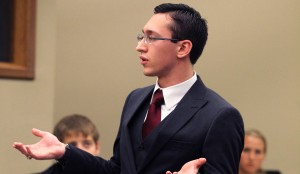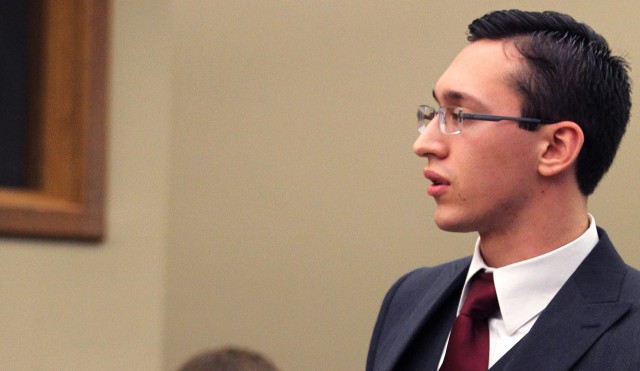
Travis Taylor | Lariat Photo Editor
Reporter
Student Senate passed the Sexual Misconduct Code Non-Discrimination Act, a proposal to reword Baylor’s Sexual Misconduct Code, in the Student Senate meeting Thursday.
The act proposed to remove the phrase “homosexual acts” from the code and replace it with the phrase “non-marital consensual deviate sexual intercourse.”
The most recent version of the Sexual Misconduct Code was established on Jan. 15, 2007. It reads, “In all disciplinary procedures, Baylor University will seek to be redemptive in the lives of the individuals involved and to witness to the high moral standards of the Christian faith.
“Baylor will be guided by the understanding that sexuality is a gift from the creator God and that the purposes of this gift include (1) the procreation of human life and (2) the uniting and strengthening of the marital bond in self-giving love. These purposed are to be achieved through heterosexual relationships within marriage. Missuses of God’s gift will be understood to include but not limit to, sexual abuse, sexual harassment, sexual assault, incest, adultery, fornication, and homosexual acts.”
The vote followed an open forum debate with alternating for and against speakers.
Major points expressed by those in favor of the bill were that the amendment was technical, not theological; the amendment would broaden to all sexual acts outside of marriage regardless of orientation; and the amendment would create a more caring, loving Christian environment.
However, some students expressed their disagreement with the proposal by saying the amendment would alter Baylor’s reputation and moral standing as a Christian university and would not affect the environment for homosexuals on campus.
Schertz senior Kimani Mitchell said, in the favor of the bill, that the amendment clarifies the language already present in the code and removes discriminatory language.
“We are simply clarifying language here,” Mitchell said. “In our world we don’t always take words semantically. They are taken with a pragmatic view, which is the connotation associated with the view. This word is discriminating. Discrimination contextually and culturally is a bad thing.”
Sophomore Jailyn Parnell said the proposal does not claim students or Baylor agrees with the homosexual lifestyle.
“It is not saying that Baylor is OK with homosexuality, or that students will all of a sudden be more welcoming,” Parnell said. “It is saying that we are not going to pinpoint homosexuals. It is saying that homosexual acts are wrong but heterosexual acts committed outside of marriage are also wrong. It is making it more equal.”
San Antonio senior Grant Senter said rewording the phrase “homosexual acts” will make homosexuals on campus feel more loved by the Baylor community.
“This is not just about a technical change,” Senter said. “This is about the entire picture of the university and what it means to be a homosexual on campus. Are you protected? Do we care for you? Do we reach out to you with Christ’s love? At this point no. What I think this bill does is take a step towards a more caring, Jesus loving community.”
On the against side, Dallas junior Connor Mighell said Baylor is private and is legally entitled to have its own policies on homosexuality.
“Baylor’s status as a private religious affiliated university allows it to define its own policies and procedures according to the presets of Christianity,” Mighell said. “It’s right to do so is protected by the Constitution of the United States and multiple Supreme Court decisions on the federal and state level. The long-standing interpretation and consensus regarding Christian Scripture hold that homosexual acts are a misuse of God’s gift of sexuality. Thus, Baylor can and should define its policies in this manner.”
San Antonio senior Stephen Bell said Baylor still welcomes all people and upholds the belief that homosexuality is wrong.
“I understand the technical argument that we are not ‘technically’ excluding homosexuality,” said Bell. “But the fact is, Baylor and many students believe that homosexuality is wrong. The conduct code should say that if they are going to have a conduct code at all. The Baylor statement on human sexuality says, in the very first sentence, ‘Baylor University welcomes all students into a safe, supportive environment in which to discuss and learn about theoretic issues including those of human sexuality.’”
San Antonio sophomore Chase Hardy Jr. said this amendment does not have the power to change prevailing ideas on campus.
“Changing a single word will have no effect on students’ attitudes toward homosexuality,” Hardy said. “Ultimately it is up to the students ‘own moral understanding and their own willingness to love one another.”
After the debate, the bill passed. Further action is pending on review by the Baylor University Board of Regents.
“I’m proud Student Senate approved the bill,” said Bushlands senior Trenton Garza, who authored the bill. “I look forward to seeing where it goes. I genuinely hope that the faculty and the senior administrators will consider joining the students in supporting to the board of regents that this code needs to be reworded.”
Arlington junior Dominic Edwards, the internal vice president, said he was proud of the senators and the way they handled the debate with professionalism.
University officials were unavailable to comment on the matter Thursday night. A copy of the resolution will be presented to all voting members of the Baylor University Board of Regents, the offices of all Baylor University senior administrators, the Faculty Senate, the Staff Senate and John Whelan, associate vice president for human resources.


